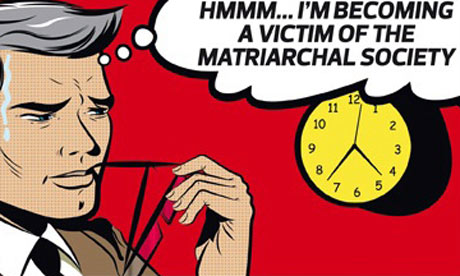You can read a rebuttal of this claim by feminist columnist Suzanne Moore at http://www.guardian.co.uk/commentisfree/2012/may/16/second-sexism-men-blaming-feminism.
Lagging at school, the butt of cruel jokes: are males the new Second Sex?
They work longer hours, face economic insecurity and suffer worse health. Now their feckless ways are lampooned in the media. A controversial new book argues that men increasingly face a prejudice that dare not speak its name

Men are the victims of reverse sexism, according to a new book.You might not have realised it, but men are being oppressed. In many walks of life, they are routinely discriminated against in ways women are not. So unrecognised is this phenomenon that the mere mention of it will appear laughable to some.
That, at least, is the premise of a book by a South African philosophy professor which claims that sexism against men is a widespread yet unspoken malaise. In The Second Sexism, shortly to be published in the UK, David Benatar, head of the philosophy department at Cape Town University, argues that "more boys drop out of school, fewer men earn degrees, more men die younger, more are incarcerated" and that the issue is so under-researched it has become the prejudice that dare not speak its name.
"It's a neglected form of sexism," Benatar says in a telephone interview. "It's true that in the developed world the majority of economic and political roles are occupied by males. But if you look at the bottom – for example, the prison population, the homeless population, or the number of people dropping out of school – that is overwhelmingly male. You tend to find more men at the very top but also at the very bottom."
The American men's rights author Warren Farrell calls it "the glass cellar". There might be a glass ceiling for women, Farrell once told the Observer, but "of the 25 professions ranked lowest [in the US], 24 of them are 85-100% male. That's things like roofer, welder, garbage collector, sewer maintenance – jobs with very little security, little pay and few people want them."
Do Benatar and Farrell have a point? A handful of statistics seems to bear out their thesis. Not only are men more likely to be conscripted into military service, to be the victims of violence, and to lose custody of their children in the event of a divorce, but tests conducted in 2009 by the programme for international student assessment, carried out by the OECD thinktank, showed that boys lag a year behind girls at reading in every industrialised country. They work longer hours, too: in 2010 the Office for National Statistics found that men in the UK work an average of 39 hours a week, compared with 34 for women. Healthwise, men develop heart disease 10 years earlier than women, on average, and young men are three times more likely to commit suicide.
"The biggest challenge is … tackling the male tendency to suffer in silence," says Tim Samuels, presenter of Radio 5's Men's Hour. "We're getting better at admitting to our weaknesses or seeking help, but there's still such a long way to go."
Men are also increasingly the butt of jokes. In a recent article for Grazia magazine, one male writer took exception to comedian Jo Brand claiming that her favourite man was "a dead one" and an advertisement for oven cleaner with the tagline: "So easy, even a man can do it." In a Guardian article on Friday, it was pointed out that the stereotyped image of a man incapable of growing up has become a staple of US film comedies – the most recent example being Jeff, Who Lives at Home, starring Jason Segel as a man still living with his long-suffering mother who lets him smoke weed in her basement.
Would the same humour be levelled at women? Benatar thinks not. "It's very hard to quantify the level of disadvantage," he says. "But one form of discrimination that is universal is the greater tolerance of violence against males. The victims of murder and severe assault are disproportionately male. There have been lab experiments with both men and women where it has been shown that we have fewer inhibitions inflicting violence against men than women."
He laughs when asked how the women in his life have responded to The Second Sexism. "They seem to be positive," he says. "Perhaps I just mix with people who are more reasonable."
In her 2008 book The Sexual Paradox, the psychologist and journalist Susan Pinker covered some of the same territory, also highlighting the anti-male bias in education and preventative medicine. "The majority of children with developmental delays, behavioural and learning problems are male," she says. "For the most part, our school system fails them. Many end up dropping out. Our mental health system, too, is focused on helping those who seek out assistance. That's not the forte of most men.
"I think the five-to-six-year gap between women's and men's lifespans could be shortened if more work was done to address male risk-taking and stress-related disease – which kill so many more men than women in their prime. The recent spate of male suicides during the financial crisis is a good example of the way male suffering is often invisible."
Another area of concern, according to Duncan Fisher, co-founder of the UK's Fatherhood Institute, is the "gratuitous exclusion" of men from child-rearing: midwifery services are described as "one-to-one care" and whereas employers frequently allow women flexible working hours if they are mothers, the same option is rarely offered to men in similar situations. "It can be so alienating," says Fisher. "Segregation, in a way, has got worse even though, under the radar, the role of fathers is actually increasing all the time. With the recession, there's much more sharing of childcare, but there's a growing gap between the reality and the rhetoric. A lot of early years services are still just 'mothers' groups', which is worrying because it leaves vulnerable men to sort out their own narrative. They don't believe they exist. They stay silent."
There are those, however, who take exception to the notion that men are a downtrodden minority, unable to speak out for fear of ridicule or repression. "It's an idea that's made more comebacks than Madonna," says Julie Bindel, the feminist writer and political activist. "It's total and utter bullshit. There are areas where men are paying the price that male supremacy gives them – there's absolutely no doubt about that.
"My dad, a working-class man from the north-east, had an absolutely horrendous job in a steel mill and he came home bad-tempered, knackered and underpaid. What he could do was come home and dominate – not in a physical way – but he could be the boss over his wife and children, he could go and sink 10 pints in the pub.
"The reality is that the public domain belongs entirely to men and the disadvantages they face are just the price they pay. It's tough cheese. Masculinity is just learned behaviour in the same way that femininity is. Ultimately, if we dismantle the patriarchy, that would end up being better for men, too."
"You can see the ways that patriarchy can be hard on men who don't fit the mould," concedes Natasha Walter, the author of Living Dolls: The Return of Sexism and The New Feminism. "There is more debate to be had about the sacrifices that men make, but obviously I wouldn't go so far as to say that shows women hold all the cards. You have to look at the structural inequality. Sexism against men doesn't exist in the same way because of the way the system is balanced."
Benatar believes this is a false distinction – and that our ignorance of the "second sexism" stems from what he terms "partisan feminists", who are interested only in the advancement of women's rights, rather than true equality and co-operation between the sexes. "It is true that women occupy fewer of the highest and most powerful positions," he writes, "but this also does not show that women are in general worse off. To make the claim that women are worse off, one must compare all women with all men, rather than only the most successful women with the most successful men. Otherwise, one could as easily compare the least successful men with the least successful women and one would then find that men are worse off."
If we measured "success" differently, taking into account a sense of broader wellbeing, gained from family relationships and a flexible work-life balance, would men be losing out? Pinker believes so. "'Global power' as measured by bean-counting the number of male chief executive officers in industry, for example, is not the only value in a just society," she says. "Health, happiness, the richness of one's human relationships, job satisfaction and how long one lives are also important values. Men are lagging behind women in all those areas."
Still, there are some men who remain relatively untroubled by this state of affairs. Tim Samuels, for one, readily concedes that we tolerate jokes about men that wouldn't be made about women or ethnic minorities "because men haven't faced hundreds of years of persecution".
"We shouldn't lose our sense of humour over this," says Samuels. "A few gags on Loose Women aren't going to signal the demise of mankind."BOOKS ABOUT BELEAGUERED MEN
Iron John: A Book About Men, 1990
The American poet Robert Bly offered a new vision of what it is to be a man. He addressed the effects of remote fathers and mourned the disappearance of male initiation rites in western culture. Finding meaning in ancient stories and legends, Bly used the Grimm fairytale Iron John, in which the narrator guides a young man through eight stages of male growth.
The War Against Boys, 2001
Christina Hoff Sommers claimed that boys were ignored by conventional wisdom that focused on solving girls' problems and warned that boys risked becoming the "second sex" if this wasn't addressed.
Fire in the Belly: On Being a Man, 2006
Sam Keen argued that men must define their identities by severing themselves from women as approval-giving mother figures and as the ancient goddess who continues to exert power within the male psyche's hidden recesses. Going beyond the modern rites of manhood – alienating work, war, performance-oriented sex – the new male "psychonaut" brings forth meaning by undertaking "a spiritual journey into the self".

No comments:
Post a Comment